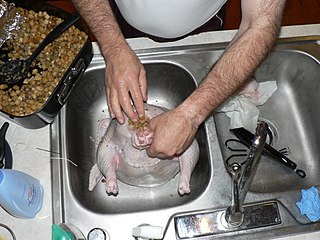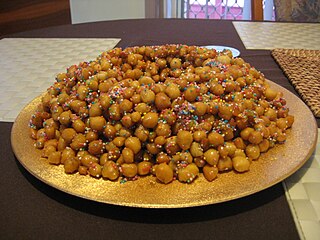Bibliography
- Dalby, Andrew (2003), Food in the ancient world from A to Z, London, New York: Routledge, ISBN 0-415-23259-7 , p. 17
According to the Deipnosophistae of Athenaeus, Apicius is the name of a cook who found a way of packing fresh oysters to send to the emperor Trajan while he was on campaign in Mesopotamia around 115 AD. [1] [2] The information comes by way of the Epitome or summary of the Deipnosophists, since the full text of this part of Athenaeus's work does not survive. If the information is correct, this is the third known Roman food specialist who was named Apicius, the earliest being the luxury-loving Apicius of the 1st century BC.
The late Roman cookbook Apicius gives a recipe for preserving oysters, among other foods. This is possibly the only detail in which the cookbook has a relationship with historical information about any of the people named Apicius.

A recipe is a set of instructions that describes how to prepare or make something, especially a dish of prepared food. A sub-recipe or subrecipe is a recipe for an ingredient that will be called for in the instructions for the main recipe.
Athenaeus of Naucratis was a Greek rhetorician and grammarian, flourishing about the end of the 2nd and beginning of the 3rd century AD. The Suda says only that he lived in the times of Marcus Aurelius, but the contempt with which he speaks of Commodus, who died in 192, implies that he survived that emperor. He was a contemporary of Adrantus.

A cookbook or cookery book is a kitchen reference containing recipes.

The Deipnosophistae is an early 3rd-century AD Greek work by the Greek author Athenaeus of Naucratis. It is a long work of literary, historical, and antiquarian references set in Rome at a series of banquets held by the protagonist Publius Livius Larensis for an assembly of grammarians, lexicographers, jurists, musicians, and hangers-on.

Stuffing, filling, or dressing is an edible mixture, often composed of herbs and a starch such as bread, used to fill a cavity in the preparation of another food item. Many foods may be stuffed, including poultry, seafood, and vegetables. As a cooking technique stuffing helps retain moisture, while the mixture itself serves to augment and absorb flavors during its preparation.
Ziaelas, third king of Bithynia, was a son of Nicomedes I and Ditizele.

Apicius, also known as De re culinaria or De re coquinaria, is a collection of Roman cookery recipes, which may have been compiled in the fifth century CE, or earlier. Its language is in many ways closer to Vulgar than to Classical Latin, with later recipes using Vulgar Latin added to earlier recipes using Classical Latin.

In Greek mythology, Chrysippus was a divine hero of Elis in the Peloponnesus (Greece), sometimes referred to as Chrysippus of Pisa.
Clearchus was a citizen of Heraclea on the Euxine who was recalled from exile by the oligarchy of that city to aid them in quelling the growing discontent and demands of the people. According to Justin, Clearchus reached an agreement with Mithridates of Cius to betray the city to him on the condition that Clearchus would hold the city for Mithridates as governor. But, Clearchus then came to the conclusion that he could make himself master of the city without the aid of Mithridates. So he not only broke his agreement with the Mithridates, but also captured him and compelled him to pay a large sum for his release.
Cleitus (Clitus) the White was an officer of Alexander the Great surnamed "White" to distinguish him from Cleitus the Black. He is noted by Athenaeus and Aelian for his pomp and luxury, and is probably the same who is mentioned by Justin among the veterans sent home to Macedonia under Craterus in 324 BC.
The Battle of Mount Scorobas was fought in 88 BC between the Roman Republic and Pontus during the First Mithridatic War. The Romans were led by Manius Aquilius, while the Mithridatic forces were led by Archelaus. Pontus was victorious.
Perimedes was a name attributed to several characters in Greek mythology.
Mithaecus was a cook and cookbook author of the late 5th century BC. A Greek-speaking native of Sicily, Magna Graecia, at a time when the island was rich and highly civilized, Mithaecus is credited with having brought knowledge of Sicilian gastronomy to Greece. Specifically, according to sources of varying reliability, he worked in Sparta, from which he was expelled as a bad influence, and in Athens. He earned an unfavourable mention in Plato's dialogue Gorgias.
Ancient Greek cuisine was characterized by its frugality for most, reflecting agricultural hardship, but a great diversity of ingredients was known, and wealthy Greeks were known to celebrate with elaborate meals and feasts.

Marcus Gavius Apicius is believed to have been a Roman gourmet and lover of luxury, who lived sometime in the 1st century AD, during the reign of Tiberius. The Roman cookbook Apicius is often attributed to him, though it is impossible to prove the connection. He was the subject of On the Luxury of Apicius, a famous work, now lost, by the Greek grammarian Apion. M. Gavius Apicius apparently owed his cognomen to an earlier Apicius, who lived around 90 BC, whose family name it may have been: if this is true, Apicius had come to mean "gourmand" as a result of the fame of this earlier lover of luxury.
Apicius is the name of a Roman lover of luxury who lived in the 90s BC and was said to have outdone all his contemporaries in lavish expenditure. According to Poseidonius, Apicius was responsible for the banishment from Rome of Rutilius Rufus, who was the author of a history of Rome written in Greek and was notable for the modesty of his entertaining.
Heraclides Lembus was an Ancient Greek statesman, historian and philosophical writer whose works only survive in fragments quoted in later authors.

Struffoli, also known as Honey Balls, is a Neapolitan dish made of deep fried balls of sweet dough. The dough is used in many Italian sweet treats such as chiacchiere. For struffoli, the dough is formed in to balls about the size of marbles. Crunchy on the outside and light inside, struffoli are mixed with honey and other sweet ingredients and formed into mounds or rings. There are many different ways to flavour them, but the traditional way is to mix them in honey with diavulilli, cinnamon, and bits of orange rind. Naming varies by region: in Calabria they are also known as scalilli, and in Abruzzo cicerchiata. They are often served at Christmas and are sometimes served warm.
Olympias was a queen consort and regent of Epirus.
Tracta, tractum, also called laganon,laganum, or lagana was a kind of drawn out or rolled-out pastry dough in Roman and Greek cuisines.